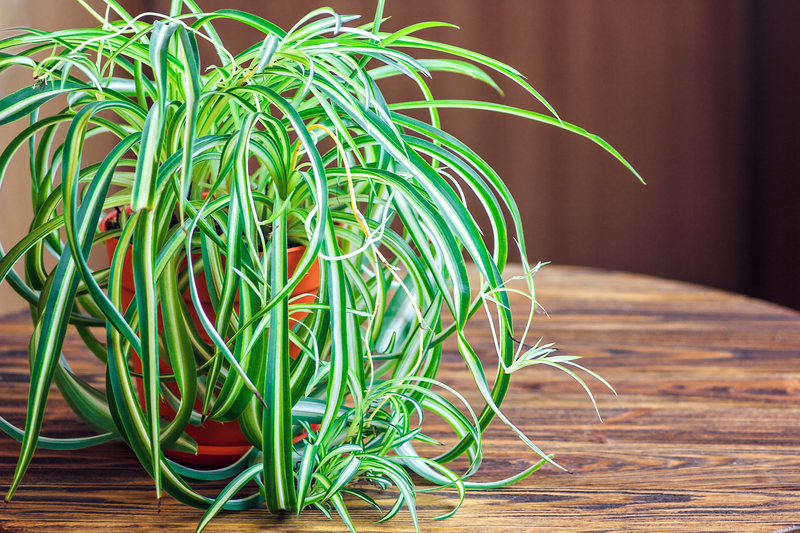Efficient Weed Control: 3 Tips for Gardeners
Posted on 17/06/2025
Efficient Weed Control: 3 Practical Tips for Gardeners
Weeds are the unwelcome guests in every garden. They compete for sunlight, nutrients, and water, causing your plants to struggle. While eradicating weeds completely is virtually impossible, efficient weed control can transform your gardening experience by significantly reducing them and fostering healthier plant growth.
This comprehensive guide provides three essential and actionable tips for effective weed management. Whether you're a beginner or an experienced gardener, you'll discover science-based strategies to create a flourishing, weed-free landscape. Read on for the most up-to-date advice and practical solutions on integrated weed control methods.

Why is Efficient Weed Control Essential?
Weed management is about more than aesthetics. These opportunistic plants challenge your garden's productivity by:
- Competing for Nutrients: Weeds absorb valuable minerals and water.
- Shading and Smothering: Fast-growing weeds prevent your desirable plants from getting vital sunlight.
- Harbouring Pests and Diseases: Some weeds host harmful insects or spread plant diseases.
- Reducing Crop Yield: In vegetable patches, weeds can dramatically lower your harvest.
Efficient weed control strategies create an environment where your plants can flourish, while reducing the time, effort, and money spent on unwelcome invaders.
Tip 1: Prevent Weeds Before They Start - The Importance of Mulching
One of the best ways to practice efficient weed prevention is by using mulch. Mulching creates a physical barrier that:
- Blocks sunlight: Inhibits weed seed germination.
- Retains soil moisture: Lessens the need for frequent watering and discourages summer weeds.
- Improves soil health: Organic mulches break down over time to enrich your garden beds.
Types of Mulch for Effective Weed Suppression
- Organic Mulches: Compost, straw, shredded leaves, wood chips; these not only suppress weeds but also enhance soil structure.
- Inorganic Mulches: Landscape fabric, black plastic, gravel; excellent for areas where organic matter breakdown is undesirable.
How to Apply Mulch Efficiently:
- Remove existing weeds before mulching.
- Apply a layer of 2-4 inches for organic mulch (1-2 inches for finer materials).
- Leave space around plant stems to avoid rot and allow for air circulation.
Key tip: Apply mulch in early spring or as soon as the soil warms up. This intercepts annual weed seeds before they can sprout.
Mulching Mistakes to Avoid
- Using weedy straw that introduces new seeds.
- Piling mulch too thickly against plant trunks.
- Choosing dyed mulches with dubious materials.
Mulch not only aids in weed suppression but helps regulate the entire soil ecosystem, making it a cornerstone of efficient weed management.
Tip 2: Smart Weeding - Techniques for Fast, Safe, and Effective Removal
When weeds inevitably appear, timely weeding prevents them from seeding and spreading. Smart weeding is about removing weeds efficiently with minimal soil disturbance and environmental impact.
Hand Weeding: Best Practices
- Target after rain or watering: Moist soil makes it easier to remove the entire root system.
- Use proper tools: Hand forks, hoes, and weed pullers reduce strain and improve efficiency.
- Get the whole root: Many perennial weeds (like dandelion and bindweed) regrow from even small root pieces. Extract as much of the root as possible.
Quick tip: Carry a weeding tool with you when strolling the garden. Small, daily weed removals save time compared to tackling a neglected bed.
Surface Cultivation and Hoeing
- Use a sharp hoe or stirrup hoe: Slice weeds off just below the soil's surface. Best for annual weeds.
- Hoe on dry, sunny days: Severed weeds dry up and die quickly, avoiding re-rooting.
- Be gentle: Avoid deep cultivation that brings dormant weed seeds to the surface where they can germinate.
Mechanical and manual weeding are best used in combination with mulch for optimum weed control efficiency.
Efficient Disposal of Weeds
- Compost only annual weeds that have not gone to seed.
- Perennial or seedy weeds should be disposed of in yard waste bins or by controlled burning.
By developing an efficient hand weeding routine, you'll dramatically decrease the weed seed bank in your soil over time.
Tip 3: Outcompete Weeds with Dense Planting and Ground Covers
The most efficient way to control weeds naturally is to outcompete them with vigorous, desirable plants. Dense plantings and low-growing ground covers act as living mulch--shading soil, crowding out weeds, and reducing germination opportunities.
Strategies for Smothering Weeds with Plants
- Close Spacing in Flower and Vegetable Beds: Sow or plant crops and ornamentals close enough that their mature foliage shades bare soil.
- Choose Aggressive Ground Covers: Plants like Ajuga, creeping thyme, and sweet woodruff form thick mats, preventing weed establishment.
- Practice Succession Planting: Replant empty areas promptly after harvest to reduce opportunities for weeds to gain a foothold.
Top Ground Covers for Home Gardens
- Creeping Jenny (Lysimachia nummularia): Vigorous and quick to establish in damp spots.
- Sweet Woodruff (Galium odoratum): Fragrant, shade-loving, and spreads gently.
- Thyme (Thymus serpyllum): Edible, aromatic, and thrives in a sunny border.
- Pachysandra: Ideal for shaded woodland gardens.
- Strawberries: Both ornamental and productive in edible landscapes.
Key tip: Select ground covers suited to your climate and soil. Native plants are especially efficient at suppressing local weed species.
Bonus: Integrated Weed Management Strategies
Combine these efficient weed control tips for the best results:
- Rotate crops to disturb pest and weed cycles.
- Monitor regularly for weed outbreaks and respond quickly.
- Apply pre-emergent organic herbicides (e.g. corn gluten meal) where appropriate.
- Minimize soil disturbance to suppress dormant weed seeds.
- Optimize soil health: Vigorous, healthy plants naturally resist competition.
By choosing methods tailored to your garden's needs, you'll achieve long-term, efficient weed management without heavy reliance on chemical herbicides or backbreaking effort.
Common Mistakes to Avoid in Efficient Weed Control
- Letting weeds go to seed: Each mature weed can produce thousands of seeds, escalating future problems.
- Neglecting garden borders and paths: Weeds multiply quickly in neglected areas and spread into beds.
- Using tillers excessively: Tilling buries and spreads perennial weed roots and exposes new seeds to light.
Efficiency in weed control comes from diligence, correct timing, and integrating multiple approaches for optimum results.
Organic and Eco-Friendly Weed Control Insights
Responsible gardeners increasingly seek organic weed prevention methods to protect pollinators and soil life. Avoid routine use of synthetic herbicides, which can harm beneficial insects and persist in the environment.
- Use flame weeders for hard-to-kill weeds in cracks and paths (with care and attention to fire safety).
- Boiling water or vinegar solutions may help in driveways, but should be used sparingly, as they damage beneficial soil life.
Focusing on sustainable, efficient weed management practices creates a healthier, more vibrant home garden for years to come.

Efficient Weed Control FAQs
What is the most effective time to weed the garden?
Weed early and often: Removing weeds when they're young and before they set seed is most efficient, especially after rain when the soil is soft.
Can you completely eliminate weeds forever?
No method will give you a 100% weed-free garden. However, consistent, efficient weed control routines will drastically reduce their numbers and impact.
Do chemical herbicides make weed control more efficient?
Chemical herbicides work fast but can damage garden crops, harm wildlife, pollute soil, and often lead to resistant weed populations. Use eco-friendly weed control methods for long-term garden health.
Conclusion: Unlocking Efficient Weed Control in Your Garden
Efficient weed control for gardeners is achievable with the right combination of prevention, smart removal, and competitive planting. Mulching, consistent weeding routines, and filling bare soil spaces are your main tools to reduce weed pressure and create a thriving outdoor space. Embrace these science-backed tips, and enjoy a healthier, more productive, and visually appealing garden--virtually free from weeds!
Start today and watch your garden transform. Efficient weed control is not just minimalist--it's also the gardener's most powerful secret weapon.


